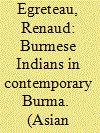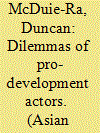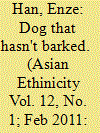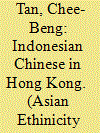|
|
|
Sort Order |
|
|
|
Items / Page
|
|
|
|
|
|
|
| Srl | Item |
| 1 |
ID:
101851


|
|
|
|
|
| Publication |
2011.
|
| Summary/Abstract |
This article seeks to explore the current role, significance and influence of Burmese Indian minorities in post-1988 Burma as well as the perceptions the Burmese indigenous society and elite have developed on them since the colonial era. British Burma (1826-1948) witnessed a massive immigration of Indian communities that disproportionately dominated Burma's colonial enterprise. A strong resentment thus arose among the Burman Buddhist majority, illustrated by the rise of a popular 'indophobia' phenomenon. Paroxysmal expressions of the colonial original trauma were observed through recurrent pre-independence anti-Indian riots as well as a specific and enduring linguistic patronizing classification of the 'Kalas' by the Burmese language. Nationalistic administrative laws, enacted by the Burmese post-independence parliamentarian and military governments, furthered the downgrading and discrimination of Burmese Indians who remain however a visible minority today, with a manifest economic weight and a strong socio-cultural presence throughout Burma. In this paper, it will, however, be argued that after years of 'Burmanization' processes, Burmese old-age 'indophobic' sentiments have turned towards more 'islamophobic' tendencies, now explicitly targeting the Muslim communities of Indian origin, but that it remains difficult to evaluate their impact on Burma's current policymaking.
|
|
|
|
|
|
|
|
|
|
|
|
|
|
|
|
| 2 |
ID:
101853


|
|
|
|
|
| Publication |
2011.
|
| Summary/Abstract |
Studies of ethnic minority peoples in Asia have long focussed on the relations between ethnic minority communities and the modern state and on the role of development in shaping these relations. This paper is concerned with how ethnic minorities respond to the state-led development. While there are numerous studies focussing on the collective agency of ethnic minorities opposing development projects, few studies consider the agency of pro-development actors. Pro-development actors are usually dismissed as co-opted, manipulated, inauthentic, or elite-driven, yet they can offer crucial insights into understanding state-ethnic minority relations and particularly intra-ethnic minority relations. This paper concentrates on pro-dam actors from the Lepcha minority in the Indian state of Sikkim to make four interlinked arguments. First, examining pro-development actors breaks the homogenous view of state-ethnic minority relations and shifts the focus to intra-ethnic relationships. Second, collective agency of ethnic minorities is not fixed in a particular relationship with the state nor does it have a particular position on development. Third, the long-term experience of development is vital in understanding how ethnic minorities manoeuvre and alter their position on contentious projects. Lastly, analysis of pro-development actors creates major dilemmas for researchers which are not easily overcome.
|
|
|
|
|
|
|
|
|
|
|
|
|
|
|
|
| 3 |
ID:
101852


|
|
|
|
|
| Publication |
2011.
|
| Summary/Abstract |
As one of China's five autonomous regions, Inner Mongolia has not been highlighted in the international news, and the Mongols have not demonstrated significant political will for greater autonomy in the way the Tibetans and the Uighurs have in recent decades. Why haven't the Mongols mobilized? This paper argues that the Mongols' lack of aspiration for greater autonomy is in part due to the relationship between Inner Mongolia and Mongolia as an independent kin state. The different trajectories of national identity construction in these two places and the perception of better living conditions in Inner Mongolia have made the Inner Mongols less anxious about their current incorporation within the Chinese state.
|
|
|
|
|
|
|
|
|
|
|
|
|
|
|
|
| 4 |
ID:
101854


|
|
|
|
|
| Publication |
2011.
|
| Summary/Abstract |
This paper describes the re-migration and adjustment of Indonesian Chinese to living in Hong Kong and their cultural belonging to Hong Kong, China, and Indonesia. Known in China as guiqiao or 'Returned Overseas Chinese', these were Chinese who re-migrated from Indonesia to mainland China in the 1950s and 1960s. By the early 1970s, many were allowed to migrate to Hong Kong. Although arriving with very little money, many have succeeded in establishing a fairly good life in Hong Kong, although there are also many who survive on low incomes. This paper discusses the experiences of the Indonesian Chinese in relation to local and transnational belonging, the perception of homelands, and the re-establishment of a Southeast Asian lifestyle in Hong Kong.
|
|
|
|
|
|
|
|
|
|
|
|
|
|
|
|
| 5 |
ID:
101850


|
|
|
|
|
| Publication |
2011.
|
| Summary/Abstract |
Currently, the construction of a 'Harmonious Society' is an important yet challenging official project in the People's Republic of China. Under Chinese Communist Party supervision, the government has undertaken some measures to achieve this goal. In the country's capital, Beijing, the majority society ('social majority') is composed of peoples considered to be Han Chinese. but the population there also includes representatives from 55 recognised minority society groups. Many such latter groups, especially Uyghurs and Tibetans, have long maintained distinctive cultural traditions, practices, languages, and 'memories' from those of the majority society - and are 'different' in physical appearance, customary dress and other features. Officially, however, all are 'Chinese citizens'. Recently, some negative and disharmonious trends have appeared in majority-minority relations. Based on academic fieldwork research, this essay focuses on 'Uyghur intellectuals' in Beijing, analytically discussing their relationships with the majority society there, identifying issues and problems in those relationships, and offering informed, constructive suggestions to achieve a more 'Harmonious Society' in China.
|
|
|
|
|
|
|
|
|
|
|
|
|
|
|
|
|
|
|
|
|